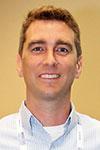
Bringing Big Data Analysis to the Search for Symptom Relief
Some patients with cancer experience fatigue so debilitating that they give up and stop their treatments. But cancer fatigue differs in severity among patients, even among those with the same kinds and stages of disease.
UC San Francisco School of Nursing Assistant Professor Kord Kober is trying to understand why, hoping to set the groundwork for new ways to treat the symptom. An evolutionary biologist, Kober is also the School’s first computational biologist. As such, he brings expertise in analyzing huge amounts of molecular data such as the epigenetics, or ongoing gene activity, of thousands of cancer patients.
Working with a team that includes Christine Miaskowski – one of the country’s foremost symptom management experts – and geneticist Bradley Aouizerat, Kober is using genomic, transcriptomic and epigenetic data and bioinformatic analyses to improve the understanding of the molecular mechanisms underlying fatigue in oncology patients.
Finding the Right Place for Symptom Research
Kober’s experience and expertise are an excellent match for the School’s commitment to improving patient comfort and outcomes, says Miaskowski.
“He brings a wealth of expertise in the assessment and management of big data sets,” she says. “As we move into the era of precision health,…treatments will be focused on the integration of large amounts of data from a variety of sources. [Kober] will be able to ask and answer research questions that examine the relationships among patients’ demographic and clinical characteristics, their symptoms and genotypic characteristics that influence patient outcomes.”
 Kord Kober Before earning his doctoral degree in molecular evolutionary biology from the University of California, Santa Cruz, Kober spent several years working on bionformatics in private industry. After earning his doctorate, his strong interest in patient care – along with the School of Nursing’s reputation for research on assessing, understanding and minimizing disease symptoms – drew him to UCSF.
Kord Kober Before earning his doctoral degree in molecular evolutionary biology from the University of California, Santa Cruz, Kober spent several years working on bionformatics in private industry. After earning his doctorate, his strong interest in patient care – along with the School of Nursing’s reputation for research on assessing, understanding and minimizing disease symptoms – drew him to UCSF.
“This is a tremendous opportunity for me to [engage on] the clinical side of research,” Kober says. “Symptoms can have a very large impact in terms of the patient experience…and have broad-reaching impact on quality of life. [But] symptom research doesn’t occur in many places; in the School of Nursing, it’s very strong.”
Personal Motivation
Kober’s interest in the topic of cancer fatigue is also quite personal. While he was in graduate school, his father was diagnosed with multiple myeloma, a bone marrow cancer, which he eventually died from. During his treatment, he experienced pronounced fatigue and pain. Kord Kober responded as a son and a scientist.
“Despite his resolve and consistent exercise, his quality of life grew poor,” Kober says. “It taught me, firsthand, the dramatic impact that cancer-related symptoms have on a patient’s functional status and quality of life [and] led me to focus on the long-term goal of understanding how demographic, clinical and molecular characteristics contribute to the occurrence and severity of common symptoms in cancer patients.”
In particular, he wondered whether there are genetic processes at play that hold the key to predicting and even eventually preventing symptoms – but found there is very little known at present about the fundamental mechanisms of fatigue.
Translational Research
At the School, Kober’s primary focus is on working with Miaskowski and Aouizerat to conduct a longitudinal study of cancer fatigue. Kober also has long been a researcher with the Women’s Interagency HIV Study, a multisite, longitudinal research project aimed at determining why antiretroviral therapy staves off disease progression for some HIV-infected women but not for others.
“By taking advantage of the longitudinal data showing the evolution of the viral genome, we can identify viral genotypes that predict poorer outcomes,” Kober says. “Our long-term goal is to identify biomarkers that may be used as a tool to improve adherence and thus outcomes in HIV-infected patients.”
The nature of his work means Kober spends much of his time at a computer screen, but patient care is at the heart of his work; he keeps a picture of his father on his desk.
He says, “Integrating big data, such as genomics and high-quality phenotypes, provides a tremendous opportunity to complete the circle of research from the patient bedside to the molecular lab and computer – and back to the patient’s bedside.”



